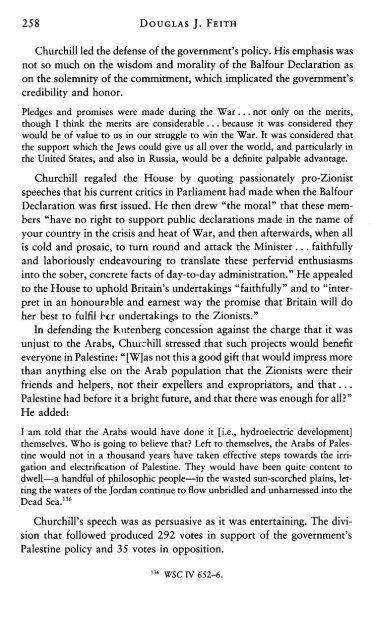Churchill, Palestine and Zionism, 1904-1922 - Douglas J. Feith
Churchill, Palestine and Zionism, 1904-1922 - Douglas J. Feith
Churchill, Palestine and Zionism, 1904-1922 - Douglas J. Feith
You also want an ePaper? Increase the reach of your titles
YUMPU automatically turns print PDFs into web optimized ePapers that Google loves.
258 DOUGLAS J. FEITH<br />
<strong>Churchill</strong> led the defense of the government's policy. His emphasis was<br />
not so much on the wisdom <strong>and</strong> morality of the Balfour Declaration as<br />
on the solemnity of the commitment, which implicated the government's<br />
credibility <strong>and</strong> honor.<br />
Pledges <strong>and</strong> promises were made during the War ... not only on the merits,<br />
though I think the merits are considerable ... because it was considered they<br />
would be of value to us in our struggle to win the War. It was considered that<br />
the support which the Jews could give us all over the world, <strong>and</strong> particularly in<br />
the United States, <strong>and</strong> also in Russia, would be a definite palpable advantage.<br />
<strong>Churchill</strong> regaled the House by quoting passionately pro-Zionist<br />
speeches that his current critics in Parliament had made when the Balfour<br />
Declaration was first issued. He then drew "the moral" that these members<br />
"have no right to support public declarations made in the name of<br />
your country in the crisis <strong>and</strong> heat of War, <strong>and</strong> then afterwards, when all<br />
is cold <strong>and</strong> prosaic, to turn round <strong>and</strong> attack the Minister ... faithfully<br />
<strong>and</strong> laboriously endeavouring to translate these perfervid enthusiasms<br />
into the sober, concrete facts of day-to-day administration." He appealed<br />
to the House to uphold Britain's undertakings "faithfully" <strong>and</strong> to "interpret<br />
in an honoUf:;1ble <strong>and</strong> earnest way the promise that Britain will do<br />
her best to fulfil i,t:r undertakings to the Zionists."<br />
In defending the kntenberg concession against the charge that it was<br />
unjust to the Arabs, Chur:hill stressed that such projects would benefit<br />
everyone in <strong>Palestine</strong>: "[W]as not this a good gift that would impress more<br />
than anything else on the Arab population that the Zionists were their<br />
friends <strong>and</strong> helpers, not their expellers <strong>and</strong> expropriators, <strong>and</strong> that ...<br />
<strong>Palestine</strong> had before it a bright future, <strong>and</strong> that there was enough for all?"<br />
He added:<br />
I am told that the Arabs would have done it [i.e., hydroelectric development]<br />
themselves. Who is going to believe that? Left to themselves, the Arabs of <strong>Palestine</strong><br />
would not in a thous<strong>and</strong> years have taken effective steps towards the irrigation<br />
<strong>and</strong> electrification of <strong>Palestine</strong>. They would have been quite content to<br />
dwell-a h<strong>and</strong>ful of philosophic people-in the wasted sun-scorched plains, letting<br />
the waters of the Jordan continue to flow unbridled <strong>and</strong> unharnessed into the<br />
Dead Sea.136<br />
<strong>Churchill</strong>'s speech was as persuasive as it was entertaining. The division<br />
that followed produced 292 votes in support of the government's<br />
<strong>Palestine</strong> policy <strong>and</strong> 35 votes in opposition.<br />
136 WSC IV 652-6.


